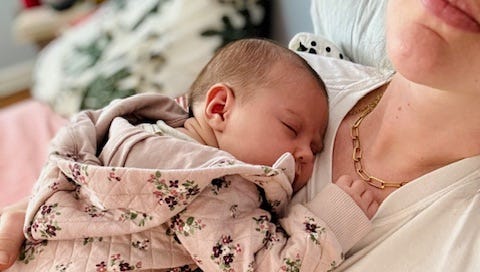People act like we’ve got drugs. The good shit. Neighbors want to know when they can stop by. They stand too close to us in the coffee shop, big faces looming over hers. What they want is the weight of a baby on their chests. To go back five, ten, twenty years and smell a newborn’s head without feeling like cracked shells of themselves. Exactly what I seem to have gotten away with.
I keep a list of things I’d like to tell my friends but don’t. It’s a job I assigned myself a long time ago: make motherhood appear less than all-encompassing. A beautiful side hustle. A chaotic room in an otherwise ordered house. I might be forgiven for being sappy and tedious, but here, among her clothes and cloths and blankets, the sap and the tedium are profound. Forgiveness would hurt my feelings.
Instead, I say intense little things to my husband. In the hospital I said, “I’m sure I don’t deserve my life.”
I regret deciding to stay in Connecticut all summer. I want to look down at Ramona’s dark hair, up at the Sierra Nevada. I want to wrestle with the current of the Colorado River or hike into canyons in New Mexico. It’s easy to convince my husband we ought to overdose on happiness. In the middle of the night, he plans a three-week road trip to Santa Fe and back. He already knows which motels have coin-operated laundry. He knows where, between Shawnee and Amarillo, our nervous dog will consent to pee. We’re about to charge it all to a credit card when one of us remembers measles. The baby is too young to get vaccinated; the southwest is where the once eliminated virus has spread. We look up hospitalization and mortality rates. I hold the baby to my chest and cry. New Mexico will have to wait.
If I can’t see mountains, I want to run. I want to take the dog into the woods and unclip his leash and run until I feel weightless. I don’t instinctually understand why my postpartum body—ravenous, engorged with milk—can’t also be strong and unrestrained. Then I strap the baby to my torso and go for a walk and remember the reason. It’s the displacement of my organs. The unpredictable gushes of blood.
My son watches me feed the baby. I lift her onto my shoulder and rub circles on her small back. She cries, and Wes is unfazed, even wistful. That he’s unsure about his gender is something I’ve understood for a while, and now he’s saying, “If I were the kind of person who could give birth, would you go to the hospital with me?”
“I’ll go with you anyway,” I say quickly. I don’t know exactly what I mean. Wes will become a parent somehow. Somehow I will be there.
Most evenings, before dinner, I have to press the heels of my palms against my eyes to keep from weeping. My sorrow is bone deep and very silly. I google it. All the moms on Reddit agree: I suffer from the sundown scaries.
By bedtime the feeling is gone. Our nights are the best part. Ramona wakes up at one or two and I nurse her while Dan gathers his supplies downstairs: the yoga ball on which he’ll bounce her back to sleep, the Criterion channel on his laptop, a Diet Coke. He takes the baby from me as she stretches her arms above her head, milk seeping from her pursed lips. He turns off the lamps. I feel like a child falling asleep in the car on the way home. I’ve never slept so automatically or deeply in my life.
Spring break sneaks up on us. Wes only turns on the television to watch Matilda (1996) or Matilda (2022). In any decade it’s a story about child abuse. When he’s not watching either Matilda, he practices scales on the piano or carries a pasta pot full of bubble solution into the backyard. Sometimes, trapped beneath the sleeping/crying/nursing baby, I hear my firstborn bashing around the attic. Singing in the driveway. Eventually we encounter each other in the kitchen, both searching for snacks. “Wish you were at school yet?” I ask him. He says absolutely not. He never wants this week to end.





This is so beautiful.
bless you in this happiness ♥️♥️♥️ you got the good drugs, for sure.